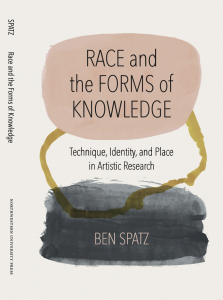
Race and the Forms of Knowledge:
Technique, Identity, and Place in Artistic Research
Ben Spatz
© 2024
320 pages
Available from Northwestern University Press
In this book, Ben Spatz crafts a fluid yet critical new framework, explored via a series of case studies that includes their own practice research, to productively confront hegemonic modes of white writing and white institutionality. Ultimately taking a lowercased version of jewishness as a paradigmatically “molecular” identity—variously configured in racial, ethnic, religious, national, and other ways—Spatz offers a series of concrete proposals for working at the intersections of embodied identities, artistic techniques, and alternative forms of knowledge.
Race and the Forms of Knowledge: Technique, Identity, and Place in Artistic Research takes inspiration from recent critical studies of blackness and indigeneity to show how artistic research is always involved in the production and transformation of identity. Spatz offers a toolkit of practical methods and concepts—from molecular identities to audiovisual ethnotechnics and earthing the laboratory—for reimagining the university and other contemporary institutions.
“A must-read text for anyone in performance studies, dance, or whiteness studies, this book explores alternative spaces to the written word as the ultimate register of culture.”
— Thomas F. DeFrantz
Northwestern University
“The implications of this book go far beyond artistic research practice. Ben Spatz’s innovative interrogations and deconstruction of identity are important for everyone engaged in radical artistic practies that challenge the hegemonic and neoliberal discourses around race and identity that persist in and out of the university.”
— Jennie Klein
Ohio University
TABLE OF CONTENTS
Note on Lowercasing
Introduction: Materialities in Artistic Research
Chapter 1: Molecular Identities
Race and the Dramaturgy of the Body
Technique and Identity
Thinking the Molecular
Audiovisualizing Thought
Chapter 2: Whiteness and the Racialization of Knowledge
White Writing
Critical Whiteness Practice
Grotowski’s White Exit
White Experiments
Chapter 3: Ethnotechnics and Audiovisuality
The Judaica Project
What is a Song?
Video Ways of Thinking
Earthing the Laboratory
Afterword: On Death and Ceremony
Acknowledgements
Works Cited






